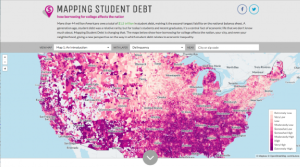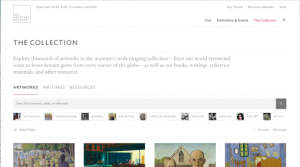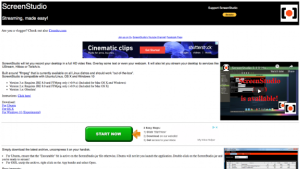Research and Education
Back to Top
|
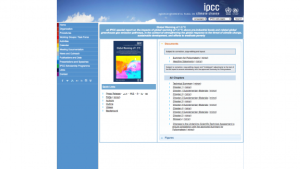 |
|
IPCC Report: Global Warming of 1.5 *C
|
Science |
|
In October 2018, the Intergovernmental Panel on Climate Change (IPCC) released a special report on "the impacts of global warming of 1.5 degrees C above pre-industrial levels." The IPCC wrote this report in response to an invitation issued by the United Nations Framework Convention on Climate Change as part of the Paris Agreement of 2015. The report "highlights a number of climate change impacts that could be avoided by limiting global warming to 1.5 degrees C compared to 2 degrees C, or more," and also "examines pathways available to limit warming to 1.5 degrees C, what it would take to achieve them and what the consequences could be." Readers may download the report's five chapters in full for a total of about 225 pages, or they may download the 34-page Summary for Policymakers for a condensed version. As Debra Roberts, Co-Chair of IPCC Working Group II, stated, "This report gives policymakers and practitioners the information they need to make decisions that tackle climate change while considering local context and people's needs. The next few years are probably the most important in our history." The IPCC was established by the United Nations in 1988 to examine research on human-induced changes to the global climate. Since then, it has produced five major assessment reports, with the most recent in 2014, and several special reports on particular topics. [JDC] |
|





|
|
 |
|
NEA: Veterans Day Activities
|
Social studies |
|
In honor of Veterans Day, the National Education Association (NEA) has assembled this excellent collection of lesson plans and educational resources focused on military "service men and women past and present." Here, educators and other interested readers will find lesson plans, activities, background resources, and more, all organized by grade level: grades K-5, grades 6-8, and grades 9-12. These teaching resources cover a broad spectrum of subjects. For example, in the lesson plan Veterans Day Is Celebrated in the United States Today, designed for grades 3-5, students "write biographical poems about a soldier following a provided format." As another example, in Women Aviators in World War II: "Fly Girls," a lesson plan for grades 6-8, students learn about the contributions of Women Airforce Service Pilots (WASPs) using historical posters and newsreels, as well as the WASPs' personal recollections. This collection also includes links to background resources, such as the Veterans History Project at the Library of Congress, whose archived veteran interviews can supplement lessons and help bring them to life. [JDC] |
|





|
|
 |
|
Climate Interactive
|
Science |
|
Recent research suggests that role-playing simulations may be particularly effective for motivating people to take action on climate change, even across political divides. Climate Interactive, a project of the Washington, DC-based nonprofit New Venture Fund, has created several such resources that interested readers can access here. These include interactive tools, such as the downloadable C-ROADS and En-ROADS simulations, which allow users to model and assess the impacts of large-scale climate pledges and energy use decisions. Simulation programs include the World Climate Simulation, which is an interactive role-playing climate negotiation game for groups of 8-50 people that has had thousands of participants worldwide. Climate Interactive's tools and programs may be of particular interest to educators, but they have also been used by policymakers and NGOs, community and business leaders, and general audiences. Readers may also be interested in the project's upcoming and recorded webinars for guidance on how to facilitate the simulation exercises. Climate Interactive was founded in 2005 by Drew Jones and Beth Sawin at MIT's Sustainability Institute (now the Donella Meadows Institute). In 2017, it won Prospect Magazine's award for Best US Energy and Environment Think Tank. [JDC] |
|





|
|
 |
|
Disability History in the Classroom
|
Social studies |
|
The Disability History Museum provides this collection of teaching resources intended to help "[integrate] disability history with larger themes commonly addressed in secondary and higher education U.S. History, American Studies, Civics, Government, and Law courses." Here, readers will find (at the time of this write-up) seven lessons in two thematic clusters, with each lesson containing primary sources, background essays, learning objectives, and a study guide. Four of these lessons are on the theme "Hearing Voices" and the Campaign for Moral Treatment, which centers around the nineteenth century reformer Dorothea Dix, while the other three lessons cluster around Educating the Senses: The 19th Century Awakes to Reform, which focuses on the wave of efforts to educate blind and deaf children. Each lesson is designed to stand alone but offers a different perspective on its corresponding cluster, and each cluster points out the relevant national standards with which its lessons align. This resource also provides a glossary that may be a helpful accompaniment to the included readings. Established in 2000, the Disability History Museum is a project of the educational media organization Straight Ahead Pictures. [JDC] |
|





|
|
 |
|
Science History Institute: Beckman Historical Collection
|
Social studies |
|
Born at the turn of the twentieth century in a tiny Illinois farming community, Arnold Beckman went on to become an influential chemist, inventor, and philanthropist to whom the National Academy of Science awarded its highest honor: the Public Welfare Medal. Beckman's inventions include the first commercially successful electronic pH meter in 1934. From this, he started Beckman Instruments (now Beckman Coulter, Inc.), which grew to specialize in a wide range of laboratory and biomedical instruments. Beckman's personal papers and the corporate records of Beckman Coulter, Inc., have been made digitally available by the Science History Institute. The Beckman Historical Collection, which currently contains over 2,400 works, includes letters, photographs, business correspondence, advertisements, instrument manuals, patents, internal publications and memos, ephemera, and more. This collection is searchable and can be narrowed by numerous fields, and images can be downloaded as a variety of file types and resolutions. The Science History Institute, which was renamed as such in February 2018 following the 2015 merger of the Chemical Heritage Foundation and the Life Sciences Foundation, is a Philadelphia-based non-profit that "collects and shares the stories of innovators and of discoveries that shape our lives." [JDC] |
|





|
|
 |
|
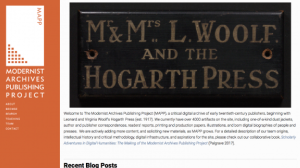 |
|
Modernist Archives Publishing Project
|
Language Arts |
|
Literature scholars, librarians, archivists, and historians may be particularly interested in the Modernist Archives Publishing Project (MAPP), an international collaborative project creating "a critical digital archive of early twentieth-century publishers, beginning with Leonard and Virginia Woolf's Hogarth Press (est. 1917)." Launched in June 2017, MAPP focuses on "the stories not so often told about books: how they are made, designed, published, distributed, marketed, and read." This ongoing project contains (thus far) over 4,000 digitized artifacts, including dust jackets, financial records, letters, illustrations, production papers, ephemera, and more. Visitors may browse MAPP's collections by works, people, archival materials, and presses, or they can search the collection for a specific author, publisher, or text. Educators interested in digital humanities may want to check out the teaching section, where they will find syllabi, student work created using MAPP, and published articles. MAPP's team includes scholars from Simon Fraser University and King's University College (Canada), the University of Oregon and Stanford University (US), and the University of Reading (UK). [JDC] |
|





|
|
 |
|
Class Central
|
Educational Technology |
|
Readers interested in free online courses from universities around the world, such as those offered on platforms like Coursera and edX, may find Class Central to be a helpful resource. Class Central is a search portal and reviews site specializing in Massive Open Online Courses (MOOCs). It describes itself as "a giant curated catalog of MOOCs spread across different online course providers," specifying that "We focus on quality, and we manually categorize and tag every MOOC." Visitors can search for courses by keyword or browse by subject, university, or provider, and Class Central also points out notable and popular courses. Each course listing provides a descriptive overview, links to commonly asked questions about the course provider, a list of related courses, and reviews written by people who have taken the course. Users can choose to register for a free Class Central account to keep track of courses they're interested in. While not every course cataloged by Class Central is free, many (if not most) of them are, and those that are not are clearly marked. Launched in 2011, Class Central also publishes the MOOC Report, which covers news, trends, analysis, annual roundups, and other articles about MOOCs and online education. [JDC] |
|





|
|










